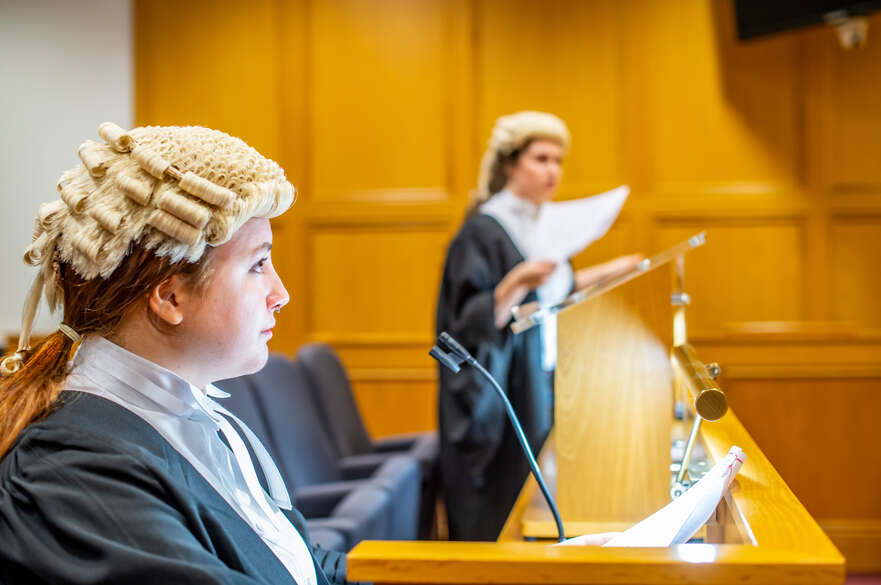Law and Legal Practice - Barristers Training Course LLM
About this course
-
100% of NTU's research submitted to the Law Unit of Assessment was assessed to be world-leading or internationally excellent in terms of research impact (REF 2021).
Why choose this course?
- This course provides an opportunity for a non-law graduate to study the seven law foundation subjects and then proceed onto the Barristers Training Course (BTC) with the aim of becoming a Barrister, in a cost effective and time efficient manner.
- This course is a combination of the BTC and PGDL, providing you with the foundation of legal knowledge and skills required for your legal training as well as preparing you to pass the Bar.
- Successful completion will enable you to obtain an internationally recognised Masters qualification by completing compulsory taught modules – all taught at Masters Level, and to be called to the Bar.
- This course is eligible for the UK Government postgraduate loan.
- This course provides you with everything you need to have the best opportunity to pass the Bar examinations whilst also developing the professional skills that really matter in practice.
- You will be taught by our outstanding teaching team, many of whom are experienced legal professionals who will provide you with excellent and personalised teaching in a dynamic and interactive teaching environment.
- Opportunities are available to further practice the legal skills you acquire through mooting, negotiation and interviewing competitions to enhance your CV.
- There is opportunity for “hands on” experience to develop professional skills and gain experience in our regulated and multi award winning teaching law firm, NLS Legal.
- NTU is 3rd for number of PGT students studying Law (Latest HESA data 2021/22)
What you’ll study
You will begin the course by studying the seven core foundation modules of a law degree in your first year at level 7.
Following successful completion of this first stage, you will then build on your knowledge and understanding of the law, studying the knowledge areas and skills set by the Bar Standards Board (BSB) and developing the attributes required to be an effective member of the Bar. You will demonstrate that you have met the requirements of the BSB's Professional Statement.
After a short introductory period for the BTC element of the course, you'll commence your study of the compulsory subjects. You'll handle seven realistic briefs (four criminal and three civil) from commencement to trial. Knowledge and skills are taught and learned through the progress of these case studies, as you respond to instructions to Counsel.
Seven Core Foundation Law Modules
- Legal and Professional Environment (including EU law)
- Contract Law
- Tort Law
- Law of Trusts
- Criminal Law
- Land Law
- Constitutional and Administrative Law
Bar Training Course Modules
Pervasives
- Case Preparation and Analysis
- Legal Research
Knowledge
- Civil Litigation and Evidence
- Criminal Litigation and Evidence
- Professional Ethics
Skills
- Advocacy
- Conference Skills
- Drafting
- Opinion Writing
Further information on what you'll study
Please be aware that all optional/elective modules are subject to availability, and NTU reserves the right to amend, change or withdraw modules at its discretion.
We regularly review and update our course content based on student and employer feedback, ensuring that all of our courses remain current and relevant. This may result in changes to module content or module availability in future years.
How you're taught
The modules on the first part of this course are delivered through a series of lectures in each subject area in order to enable a student to develop relevant basic knowledge and understanding. The lectures act as a stimulus to encourage involvement in the relevant knowledge and understanding and to develop independent learning.
In order to stimulate previously acquired knowledge and develop that knowledge further in context, you will also participate in regular workshops delivered over the duration of the course. These workshops provide a vital opportunity to test knowledge and understanding and to develop skills through student-focused debate and discussion, problem solving, application of the relevant law and analysis, synthesis and evaluation of your own independent learning. All workshops involve directed and self-directed study and research and facilitate the development of communication skills. Tutor feedback provided in these workshops then provides a platform for continued progress and improvement.
The second part of the course, which focuses on the Barristers Training element, is taught predominantly by way of practical small group sessions in high-quality teaching accommodation, which includes impressive mock courtrooms. You'll be taught in groups of approximately 12 students, except for Advocacy and Conference where you will be taught in groups of six students. These small group sessions are supported by large group sessions, online materials, self-study sessions and guest speakers.
Alongside dedicated sessions for the separate knowledge and skills areas, you'll also develop these through the use of briefs that replicate the reality of practice at the Bar and allow you to practise and experience case management from beginning to end. In the context of both Civil and Criminal, this will include participation in full trial hearings.
Research informed teaching
By daring to think differently our research is tackling real-world issues. The subjects you will study with us are informed by our research so you can be sure your knowledge will be cutting-edge in your field. In the last Research Excellence Framework (REF 2021) - the UK's system for assessing the quality and impact of research in universities - we’re proud that 100% of NTU's Law submission was assessed to be world-leading or internationally excellent.
Careers and employability
Your future career
Successful completion of this course enables you to proceed to be called to the Bar and proceed to pupillage. We have a dedicated careers and placement service who will support you in your search for both pupillage and alternative employment.
The team provides practical sessions, advice and support, such as mock interviews. A number of presentations are given throughout the year reflecting the changing needs of students as they progress through the application process. The focus of these presentations is on both practice at the Bar, which reflects the ambitions of most of the students, and alternative careers.
Students should view careers advice as something about which any BTC tutor can be approached. We are able to offer first-hand advice and guidance to students given our experience in practice.
We run a successful NLS Legal and strongly advise students to get involved in these activities.
Links with the profession
In addition to the programme of guest lectures and practitioner workshops that run during the year, we give you further opportunities to experience life at the Bar, and to meet practitioners.
Our dedicated and experienced careers consultants provide guidance and support to help you secure work experience or other legal employment.
Campus and facilities
Entry requirements
UK students
Academic entry requirements
An undergraduate degree (2.1 or above)
(A 2.2 honours degree will be considered with evidence of exceptional achievement elsewhere in the application, for example, awards, scholarships, work experience - paid or unpaid).
All applicants should provide evidence in their personal statement of their commitment to a career in law and will be required to provide a full reference in support of their application.
Additional requirements for UK students
Before students embark on the course, the following should be noted:
Inns of Court
It is an enrolment requirement that you must join an Inn of Court before you can proceed on the programme. For more details, including deadlines and fees please contact the relevant Inn:
Certificate of Academic Standing (CAS)
Anyone with non-standard qualifications (for example, if you hold a degree from outside the UK or Republic of Ireland) is required to present a Certificate of Academic Standing (CAS) from the Bar Standards Board before they enrol on the course. Full details of who is required to obtain this Certificate can be found on the Bar Standards Board website.
Recognition of Prior Learning
NTU may admit a student with advanced standing beyond the beginning of a course, through an assessment of that student's prior learning, whether it is certificated or uncertificated. Our Recognition of Prior Learning and Credit Transfer Policy outlines the process and options available to these prospective students, such as recognising experiential learning or transferring to a similar course at another institution, otherwise known as credit transfer.
All prospective students who wish to apply via Recognition of Prior Learning should initially contact the central Admissions and Enquiries Team who will be able to support you through the process.
Getting in touch
If you need more help or information, get in touch through our enquiry form
International students
Academic entry requirements
An undergraduate degree (2.1 or above)
(A 2.2 honours degree will be considered with evidence of exceptional achievement elsewhere in the application, for example, awards, scholarships, work experience - paid or unpaid).
All applicants should provide evidence in their personal statement of their commitment to a career in law and will be required to provide a full reference in support of their application.
Additional requirements for international students
Before students embark on the course, the following should be noted:
Inns of Court
It is an enrolment requirement that you must join an Inn of Court before you can proceed on the programme. For more details, including deadlines and fees please contact the relevant Inn:
Certificate of Academic Standing (CAS)
Anyone with non-standard qualifications (for example, if you hold a degree from outside the UK or Republic of Ireland) is required to present a Certificate of Academic Standing (CAS) from the Bar Standards Board before they enrol on the course. Full details of who is required to obtain this Certificate can be found on the Bar Standards Board website.
Recognition of Prior Learning
NTU may admit a student with advanced standing beyond the beginning of a course, through an assessment of that student's prior learning, whether it is certificated or uncertificated. Our Recognition of Prior Learning and Credit Transfer Policy outlines the process and options available to these prospective students, such as recognising experiential learning or transferring to a similar course at another institution, otherwise known as credit transfer.
All prospective students who wish to apply via Recognition of Prior Learning should initially contact the central Admissions and Enquiries Team who will be able to support you through the process.
English language requirements
It is a requirement of the LLM BTC that students are fluent in English. Applicants need to be able to demonstrate that their English language ability is equivalent to a minimum score of 7.5 in each element of the IELTS test.
International students will be required to produce a certificate evidencing the necessary IELTS scores or equivalents* unless they have:
- An actual or predicted degree classification of 2.1 or above in a degree undertaken in the UK and awarded by a UK institution;**
- An actual or predicted commendation or above in the GDL undertaken in the UK and awarded by a UK institution; or
- An actual or predicted commendation or above in a taught Masters undertaken in the UK and awarded by a UK institution.
*We currently accept the following as alternatives to IELTS:
- Pearson Test of English (Academic)
- TOEFL
- KTE (Kaplan Test of English).
** 1 year of study in the UK will satisfy this requirement.
Find out more about our English language requirements for International students: English language requirements.






